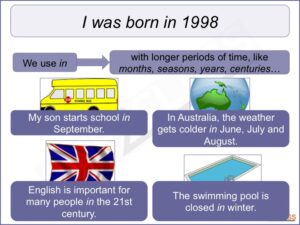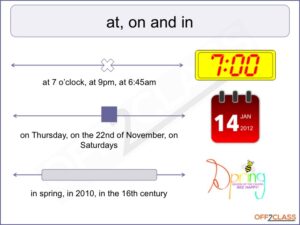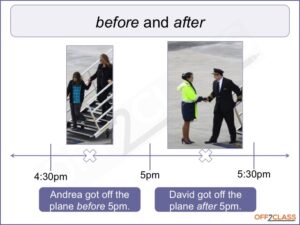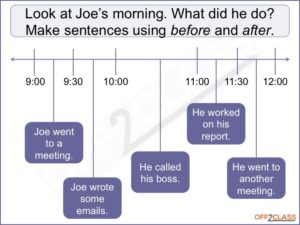5 min read
Share this post

Many teachers avoid tackling prepositions (in general) because it can be a challenging topic to approach with their ESL students. Of course, it doesn’t help that locating properly animated lesson content to guide your students through the learning can also be tough. But consider how often you use constructs like, at ten o’clock, in seven minutes, before midnight, until spring etc.. in everyday common speech. For this reason we think approaching prepositions of time is key even at the beginner level. We recommend introducing prepositions of time (the basics such as in/at/on) at a beginner level, and reintroducing more prepositions of time periodically as your students advance through their ESL journey.
We have 6 lessons covering the gamut of prepositions of time (P1.1 to P1.6). They can be found in the Prepositions Category of our Teacher tab. We think they provide an invaluable resource to ESL teachers running their own private lessons, and we think you’ll get a lot of value out them. Here is a brief summary of what you’ll find:
P1.1 – P1.2 – With-Time-At-On-In
In our first two lessons we introduce the most common prepositions of time, at / on / in. Remember, we use at with exact or specific times (at ten pm). We use on with days of the week and dates (on Monday, on the 2nd of April). We use in with longer periods of time (in 1992). Our introductory lessons are loaded with illustrative examples, and simple exercises for students to start discovering these prepositions of time. We also provide repetitive gapfills at the end of each lesson so students can start seeing how common these prepositions of time are in everyday speech:


P1.3 – P1.4 – With-Time-Before-After-During-While
In our next two lessons we introduce the more intermediate prepositions of time before / after / during / while. We recommend tackling these lessons once your students become comfortable with the more basic prepositions of time at / on / in. We use a number of illustrative (picture based) examples to introduce the concepts of before and after. We also use a number of agenda (personal calendar) examples to get your students using the targeted language:


P1.5 – P1.6 – Advanced Prepositions of Time
In our final two lessons covering prepositions of time, we cover the more advanced concepts of from….. to / until / beyond / past / at around / by / past / through / throughout / between. We recommend introducing these more advanced prepositions once your students are comfortable using at / on / in / before / after in everyday sentences and speech. These more advanced prepositions may need to be revisited several times so don’t fear if the first time you approach theses prepositions they do not fully stick with your students. You may also need to revisit our earlier prepositions of time lessons prior to tackling these more advanced topics.
Share this post



Leave a Reply